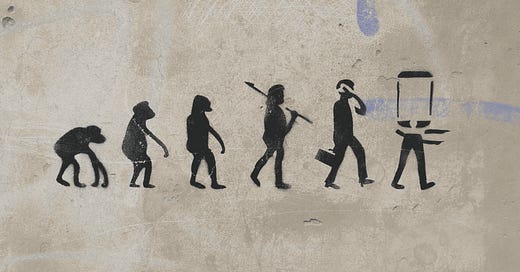Trump is Not a Social Darwinist
The other day my mom sent me this pretty good essay by
that argues that Social Darwinism is the “doctrine that most closely resembles Trumpism.” But from my perspective, there is no “doctrine” to Trumpism—it is best understood as an aesthetic and theory of distraction.Incoherent political projects, by the way, are not at all uncommon throughout human history. But also, critiquing incoherent politics as though they are coherent (doctrinal) can lead oneself toward incoherence.
That’s what’s sort of happened here.
One of the figures that
references in his above essay as “Sound[ing] familiar?” to Trump today is William Sumner. I’ve actually done archival research on Sumner here at Yale—literally touched his diaries—where he spent his whole career and where he was almost fired multiple times.In Sumner we can find all the seeds of modern conservatism, but not Trump. Sure, Sumner said that “millionaires are the product of natural selection, acting on the whole body of men to pick out those who can meet the requirement of certain work to be done,” but he was almost fired multiple times from Yale for his public denunciation of tariffs.
In his 1885 work Protectionism: The -Ism Which Teaches That Waste Makes Wealth, he argued that tariffs are essentially a form of legalized plunder:
Protective taxes are those that a man pays to his neighbor to hire him (the neighbor) to carry on his own business. The first man gets no equivalent. Hence the transaction is one of plunder.
Throughout the Gilded Age, Sumner consistently cautioned the public that tariffs function as a tax on consumers, benefiting specific producers at the expense of the general public. This, of course, does not sound like Trump—someone who, oddly, has always been obsessed with the idea of tariffs. And this is because Sumner was an actual Social Darwinist who believed the intrusion of the state in “natural market forces” was horrible for society.
The fact is that Trump is not really a free market guy. He’s just a guy. Being a free market person is not the same as not having a theory of politics. And that’s the thing we have to keep reminding ourselves about Trump—he doesn’t have a theory of politics, which is fine for like, 95% of people. Indeed, everyone that knows Trump says that he’s “got a gift for people,” and to be honest, I don’t doubt that. You might; I don’t—he’s, like, a normal, random, charismatic guy. It’s fine.
But again, libertarianism is a positive theory of politics, just as much as socialism is. It’s a real thing, with real values that are often naturalized, at least in the United States, through what is often referred to as “Social Darwinism,” or the idea that a moral society is run by the principle of “survival of the fittest.” Social Darwinism is a kind of progressivism. It is a political ideology focused on adaptation and innovation that elevates the 1% and doesn’t really have a theory of the 99%, or a theory of what a proper relationship between the 1% and 99% should be, which is what puts it at odds with
. It is an elite politics.But of course, this isn’t Trumpism, which is built on populist anti-elitism. Social Darwinism sanctifies the elite; Trumpism tears them down. The bastions of latent Social Darwinism are in places like where I sit typing this: Yale’s Sterling Memorial Library—the places where the winners of the horrible multigenerational American rat race sit and ponder things like, as I did this morning, the relationship between neoclassicism and Deist senses of “nature” in the late 18th century (hint: for both, nature is seen as uniformity that is knowable by rational means).
My guess is that if Sumner were alive, he would be writing columns in The New York Times decrying the Trump tariffs, making fun of his COVID checks, and calling for the total privatization of our healthcare system. In private, he would no doubt call Trump an “absolute idiot.” He would be in love with Elon Musk and hate the paternalistic, authoritarian, false piety of JD Vance.
He’d be a Rand Paul guy, which neither Trump nor
are.




